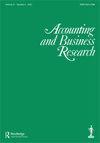主观绩效评估和管理工作成果
IF 1.4
4区 管理学
Q2 BUSINESS, FINANCE
引用次数: 5
摘要
组织设计绩效评估系统以获得期望的工作成果。本研究分析了主观绩效评估(SPE),一种特定类型的绩效评估,如何与管理工作结果——离职意向、组织认同和绩效——相关。为此,我们考虑了两种可能的机制:反馈质量和对主管的信任。此外,我们还考虑了在SPE中添加客观的性能度量是否会改变这些关系。基于751名中小企业高管和中层管理人员的问卷调查,我们发现SPE与反馈质量呈负相关,但当SPE与客观绩效指标结合使用时,这种影响会减轻。当分析中还考虑反馈质量时,SPE与对主管的信任没有直接关系,因为这两种机制是相互关联的——我们发现反馈质量与对主管信任之间存在正相关关系。这两种机制都与离职意向呈负相关,但只有对主管的信任与组织认同呈正相关。最后,离职意向和组织认同都与绩效呈正相关。我们的研究结果表明,使用SPE的公司可以通过在其绩效评估系统中添加客观的绩效指标来改善工作成果。本文章由计算机程序翻译,如有差异,请以英文原文为准。
Subjective performance evaluation and managerial work outcomes
Organisations design performance evaluation systems to obtain desired work outcomes. This study analyses how subjective performance evaluation (SPE), a specific type of performance evaluation, is related to managerial work outcomes—turnover intention, organisational identification, and performance. To this end, we consider two possible mechanisms: feedback quality and trust in the supervisor. Moreover, we also consider whether adding objective performance measures to SPE alters these relationships. Based on questionnaire responses from 751 top executives and middle managers in small and medium enterprises, we find that SPE is negatively related to feedback quality, but this effect is mitigated when SPE is used jointly with objective performance measures. SPE is not directly related to trust in the supervisor when feedback quality is also considered in the analysis because the two mechanisms are inter-related—we find a positive relationship between feedback quality and trust in the supervisor. Both mechanisms are negatively related to turnover intention, but only trust in the supervisor is positively related to organisational identification. Finally, both turnover intention and organisational identification are positively related to performance. Our findings suggest that companies using SPE can improve work outcomes by adding objective performance measures to their performance evaluation system.
求助全文
通过发布文献求助,成功后即可免费获取论文全文。
去求助
来源期刊

Accounting and Business Research
BUSINESS, FINANCE-
CiteScore
3.40
自引率
11.80%
发文量
38
期刊介绍:
Accounting and Business Research publishes papers containing a substantial and original contribution to knowledge. Papers may cover any area of accounting, broadly defined and including corporate governance, auditing and taxation. However the focus must be accounting, rather than (corporate) finance or general management. Authors may take a theoretical or an empirical approach, using either quantitative or qualitative methods. They may aim to contribute to developing and understanding the role of accounting in business. Papers should be rigorous but also written in a way that makes them intelligible to a wide range of academics and, where appropriate, practitioners.
 求助内容:
求助内容: 应助结果提醒方式:
应助结果提醒方式:


